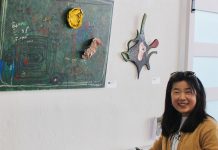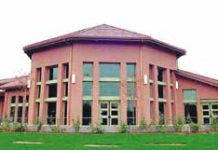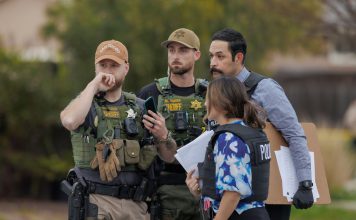Rounds of applause echoed from the Community Room of Gilroy Library on April 30, where the first FixIt Clinic in Santa Clara County took place.
According to FixIt Clinic founder Peter Mui, the goal is to “demystify technology so we can make better policy choices as a society going forward.”
About two dozen people stopped by the clinic, carrying broken appliances and other objects in disrepair. The applause followed each successful “fix” as item after broken item was repaired by the FixIt coaches and workshop participants.
“We don’t fix things for you. We’re all about teaching you to fish as opposed to handing you a fish,” Mui said. “People coming to a FixIt Clinic should have an expectation that they’ll have to roll up their shirt sleeves and participate in their own disassembly and repair.”
“We saw a blender, a few lamps, a boom box, a table, a popcorn maker, a printer, a clock, and about 15 articles of clothing,” Gilroy librarian Lisa Duff said.
“We’ll really take on anything that anyone brings in the door,” Mui said.
After hearing Mui speak at a California Library Association conference, Duff was convinced that the clinic would be a great fit for Gilroy.
“We have all these cheap consumer electronics. We buy a $20 toaster and when it breaks two years later, oh well you just go out and buy another $20 toaster,” Mui said.
“Ostensibly I don’t think we’re paying the true cost of these things from an environmental standpoint. And a lot of those toasters can be repaired. So rather than winding up in a landfill, have it go back into service.”
Kimberle Herring, an employee of Waste Management District in Monterey County attended the clinic. She is now considering hosting a clinic in her area.
“I think so far the spirit is wonderful,” Herring said of the event.
Mui held the first clinic in 2009 in Berkeley. The repair rate for the clinics that followed has averaged between 70 and 75 percent.
Even if the individual’s broken item isn’t working, they leave the clinic with information regarding what parts they need to order, and where to order them.
Mui hopes to establish satellite FixIt Clinics nationwide. Ideally the Gilroy Library will become one of those sites.
“I have a series of successful satellites now in Minneapolis, Boulder, Colorado, Austin, Texas; San Diego Public library is holding monthly FixIt Clinics,” Mui said.
According to Duff, “we had some people walking by who stopped to help, or check it out, and are now potential local FixIt coaches. So my hope is to have one again in the future.”
FixIt coaches are volunteers who provide the tools and talent for each clinic held by Mui.
“Over time we want to blur the distinction between being a participant and a FixIt coach, so that basically everybody there is helping everybody else fix their stuff,” Mui said, adding, “It’s sort of like a group participatory event.”
For the Gilroy clinic, Duff recruited her own set of coaches, including members of the library staff, students from Christopher High School and community volunteers.
Shay Azevedo of Gilroy was one of those volunteers. Not only did she bring her expertise in sewing, she also brought along her 1930s sewing machine.
“I’ll help out, this is Gilroy, it’s my home, and it’s an awesome place to live,” she said.
Another sewing expert and FixIt coach, Sarah Foster-Peck, has always been in the mind set of “fix it, mend it, never throw anything away,” and she’s worked with Mui for the past few months.
“Five to 10 percent of our waste-stream through a landfill, is clothing,” Foster-Peck said, explaining the move toward material and textile repair offered at the clinics.
“Sewing is a really accessible hobby, and I was astounded by how many weren’t sewers.”
Mui would love to have libraries hold FixIt Clinics all the time. As he sees it, libraries are a natural fit. It’s a familiar place in the community, and a place that people come to for resources.
“Librarians get it. In the new millennium, libraries are looking for programing beyond books. World domination through FixIt Clinics,” Mui said laughing.
Gilroyan Edward Golder stopped by with a broken charger for his tablet. The tool he needed, a soldering gun, was made available to him and now Golder’s charger is as good as new.
“I get to use my tablet again,” Golder said.
He agrees with Mui that the library can become a place for more than books.
“To me a library is books, but you’ve got to diversify,” Golder said.
Mui describes the FixIt clinic as an AA meeting for broken stuff, and he considers them family events, viewing the precocious middle-schooler as his core demographic, since he or she inherits all the broken stuff in the family.
“If we’re going to change hearts and minds in societal ideas around consumption, they’re the core group to target,” Mui said.
“I am very happy with the turnout, and that people were able to participate in fixing their own items. It was great to see the joy people had after their item was fixed,” Duff said.
“It is also really great to see that these items are able to be used again and not thrown away.”













